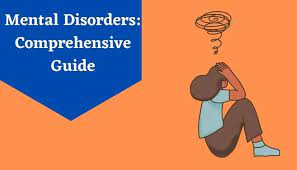Dealing with OCD dementia can seem like a daunting task, but with the right information and support, you can overcome it. In this comprehensive guide, we will discuss everything from diagnosis to treatment options and beyond. We want to help you understand this condition and learn how to best manage it for the sake of both yourself and your loved one.
Contents
What Is OCD?

Obsessive-compulsive disorder (OCD) is a mental health disorder that causes individuals to experience recurring, intrusive, and unwanted thoughts or behaviors. People with OCD feel compelled to perform certain rituals or routines in order to reduce feelings of anxiety caused by their obsessions. While there is no single cause of OCD, it can be triggered by environmental or psychological factors, including stress, trauma, or genetic predisposition.
What Is Dementia?
Dementia is an umbrella term for a range of progressive neurological disorders that cause a decline in cognitive function, including memory loss and difficulty with thinking, problem-solving, speaking, and other physical activities. Alzheimer’s disease is the most common type of dementia, but it also includes Parkinson’s disease, Huntington’s disease, and other conditions. Dementia is caused by physical changes in the brain, such as damage to nerve cells or abnormal protein deposits that can lead to changes in behavior, thinking, and mood. It is a progressive condition, meaning it gradually gets worse over time. Although there is currently no cure for dementia, treatments are available to help manage symptoms
Can OCD Turn Into Dementia?
In some cases, it is possible for OCD to transition into a form of dementia. This transition can happen in people whose OCD has become severe and is not managed effectively. If left untreated, the symptoms of OCD may worsen over time and lead to changes in brain functioning that impact cognitive abilities. These changes can cause difficulty with activities of daily living, impair judgment, and reduce the person’s ability to engage in social activities. It also increases their risk of developing dementia-like symptoms, such as impaired memory, confusion, disorientation, difficulty planning and organizing, and problems with problem-solving.
Symptoms
There are various symptoms of OCD Dementia:
Memory Loss
Patients will experience memory loss, including forgetting recent conversations, events, or even their loved ones’ names and faces.
Difficulty Concentrating
OCD Dementia patients may be easily distracted and unable to focus on tasks for extended periods of time. They may also have difficulty remembering instructions and retaining new information.
Disorientation
Patients may become easily confused and disoriented, especially in novel environments or unfamiliar situations.
Changes in Behavior
A person with OCD Dementia may display changes in their behavior and personality, including becoming more passive or withdrawn than usual, having difficulty completing tasks they once did with ease, or exhibiting signs of irritability, impulsivity, and distrust.
Poor Decision Making
OCD Dementia patients may experience difficulty making decisions and have difficulty understanding logical consequences of their choices.
Apathy
Patients may become apathetic, lack the motivation to engage in activities they once enjoyed, or have difficulty expressing emotion.
Difficulty with Language
Patients may have trouble finding the right words to express their thoughts and feelings, speaking more slowly than usual, or having difficulty understanding spoken language.
Changes in Movement
Patients may experience tremors or stiffness in movement, shuffling gait, impaired balance or coordination, or difficulty with fine motor skills.
It is important to remember that while OCD Dementia can be a progressive and debilitating condition, there are treatments available that can help manage the symptoms and improve quality of life. Early diagnosis and treatment is key to slowing down the progression of the disease and helping patients and their families cope with the changes.
If you or a loved one is exhibiting signs of OCD Dementia, it is important to seek medical attention immediately. With proper diagnosis, treatment, and support systems in place, individuals living with OCD Dementia can lead meaningful lives despite this challengiing condition.
What Are The Treatment Options For OCD Dementia?
There are various treatment options for OCD Dementia:
Cognitive Behavioral Therapy (CBT)
CBT is a type of psychotherapy that focuses on identifying and changing negative thought patterns in order to reduce symptoms. It can help people with OCD Dementia learn how to better manage their thoughts, emotions, and behaviors surrounding their obsessions and compulsions.
Medication
Medication such as antidepressants or antipsychotics can be used to help manage the symptoms of OCD Dementia.
Social Support
Having a strong social support network is important for those suffering from OCD Dementia, as it can provide much needed comfort and reassurance during difficult times. It is important to have supportive family members, friends, and even counselors who can offer compassionate understanding and encouragement.
Alternative Therapies
There are also alternative therapies such as art therapy and music therapy that can be used to help manage the symptoms of OCD Dementia. These therapies focus on helping individuals express their feelings in a creative manner and learn more effective coping mechanisms for dealing with their obsessions and compulsions.
These are just some of the treatment options available for those suffering from OCD Dementia. It is important to speak with your doctor or mental health professional about which treatment option may be best for you. With the right treatment, it is possible to manage symptoms and live a happy and fulfilling life.
Self Help Tips
There are various self-help tips:
Set realistic goals
Start by setting small, achievable goals for yourself and build up from there. Having an end goal in sight will help you stay motivated on the journey of self-improvement.
Exercise
Regular exercise has been proven to reduce stress, improve mood, prevent diseases, increase energy levels, and improve overall physical and mental health.
Eat healthily
Eating a balanced diet is crucial for physical and mental health, as well as overall well-being. Eating a variety of nutritious foods will help ensure your body gets the nutrients it needs to function optimally.
Get enough sleep
Adequate sleep plays an important role in maintaining good physical and mental health. Aim for at least 7-9 hours of sleep per night.
Practice mindfulness
Mindfulness is a technique that helps you become more aware of your present emotions, thoughts, and actions. Practicing mindful meditation can help improve your mood, reduce stress, and enhance self-awareness.
Connect with others
Building and maintaining meaningful relationships is essential for emotional well-being. Connecting with others can help reduce stress and offer support when you need it most.
Take care of yourself
Make time to do things you enjoy, such as reading a book, listening to music, or taking a relaxing bath. Put your own needs first and allow yourself some downtime.
Find a mentor
Having someone to talk to who has gone through similar experiences can offer valuable support and guidance on your journey of self-improvement.
Make time for hobbies
Engaging in activities you enjoy can help take your mind off things and provide an outlet for stress relief.
Challenge yourself
Push past your comfort zone by taking on new challenges and learning new things. Taking risks will help you grow as an individual and gain a better understanding of yourself.
These are just some of the many self-help tips that can help you make positive changes in your life. Experiment to find what works best for you, and remember that it’s okay to make mistakes. With dedication and hard work, you can achieve your goals!
Good luck!
Conclusion
It may be concluded that OCD dementia is a real disorder and that it should be taken seriously by medical professionals. People with this condition can experience significant impairment in their quality of life, as well as distress and difficulty functioning in everyday activities. Treatment options are available to help those who suffer from OCD and dementia manage their symptoms and lead more fulfilling lives. Although the cause of OCD dementia is not known, research is ongoing in order to provide better insight into the condition and possible treatments. For now, education and support are the best tools for those affected by OCD dementia.
It is also important to remember that everyone experiences aging differently, and there is no “one size fits all” approach to managing dementia. If you have any concerns or questions about your own cognitive health, it is best to speak with a medical professional who can provide appropriate advice and guidance. By understanding the signs and symptoms of OCD dementia and seeking the right help and support, people affected by this condition can gain more control over their lives. With the proper care, those living with OCD dementia can regain some of the quality of life they had before their diagnosis.
For more information and guidance, please contact OCDMantra. OCD is a mental health disorder characterized by obsessions and compulsions. If you have any queries regarding OCD treatment, ERP therapy experienced therapists at OCDMantra can help: Book a trial OCD therapy session


